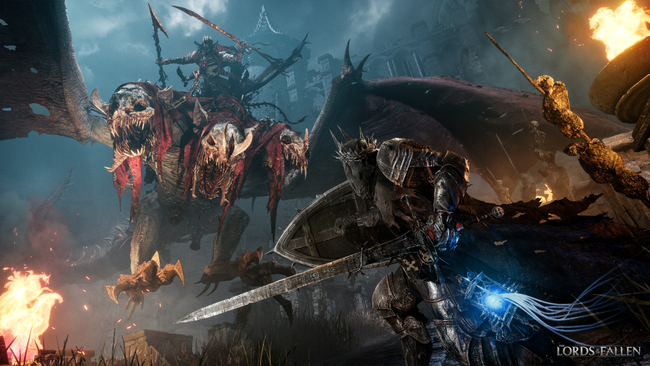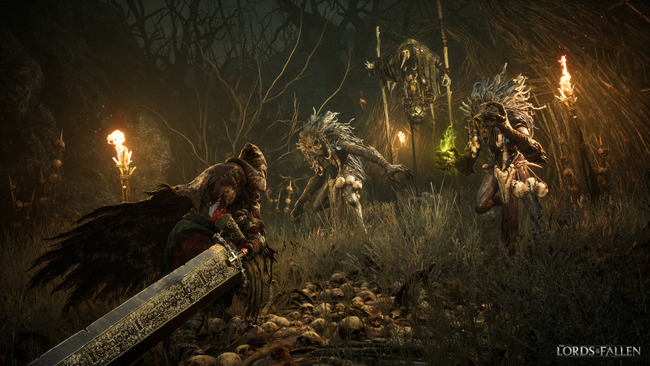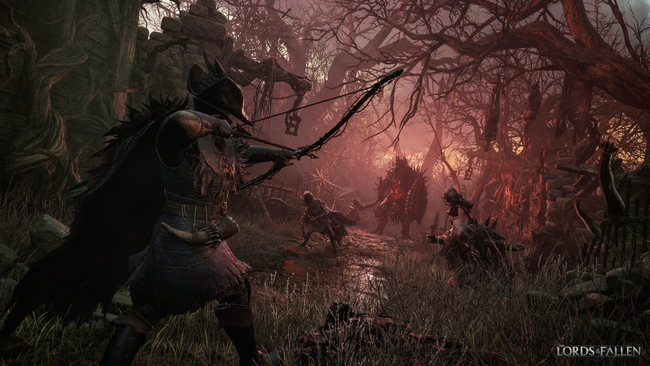
Lords of the Fallen (2023) is shaping up to be more than just its inspirations
Released in 2014, the original Lords of the Fallen was only ever discussed in comparison to its contemporaries - From Software's Demon's Souls and Dark Souls, and it's fair to say that those comparisons weren't always flattering. In the nearly decade since, however, many other studios have attempted the same feat; to offer another take on the gameplay style that has continued to be popularized by From Software and their contemporaries. Lords of the Fallen (the new one) is of course much of the same - but this time around, studio HEXWORKS wasn't just content to follow the same path that others have followed, and based off the several hours we had a chance to get our hands on the game last month during a preview event in Los Angeles, California - fans of the genre have something to look forward to.
From the get-go, one of Lords of the Fallen (2023)'s immediate eye catches is the addition of the dual realms system. Overlayed on top of each other is two versions of the same game world; that of the living, and of the dead. Using the power of the lantern you wield you can highlight from the land of the living a section of the same area in the land of the dead, and it's this core gameplay element that is at the heart of Lords of the Fallens greatest improvement - level design.

Sometimes, the path forward requires players to consider how both realms interact with each other. For instance; the land of the dead completely lacks water, so if you find yourself face-to-face with a dead-end leading to a lake, you might need to transition to the land of the dead by invoking a spell that will essentially kill your player character. When in the land of the living, dying will instead transition the player character to the land of the dead - offering a chance for you to continue without losing progress, assuming that you can prevent another death from occurring before finding a statue in the environment that will allow you to return to the other realm.
Some traversal puzzles will require players to make the transition between realms manually, and even when you aren't tasked with completely making the jump across realms, puzzles might require you to use the lantern to check your surroundings in the other realm; maybe there's a structure in one that's not in another. Maybe a gate might block your path, but by using the lantern to light the way you can walk right through it. The lantern has other abilities, too; like the power to rip the soul from an enemy's body, offering the opportunity to deal greater damage within a short period of time.
One promising aspect of the level design is how it employs a trick that From Software has been well known for utilizing; having the levels horizon point to where you can and should be heading. One unintended test of the game's verticality came from when we fell off a ledge during a section of the world that was built into a cliff face - somehow we clipped through a death wall all the way to what appeared to be a boss arena all the way below, though the collision with the ground did quickly send us back to our last checkpoint. It reminded me of the Depths and Blighttown from the original Dark Souls in all the best ways, and out of everything from our preview, it left me the most confident that HEXWORKS is off on the right foot with the game's level design.

From a combat perspective, Lords of the Fallen feels like a major step up from its predecessor. There's still a weight to its combat, but lighter weapons have the appropriate responsiveness to them that you would expect, and things feel generally more in line with - as an example - From Software's more recent releases with Dark Souls 3 and Elden Ring. At least so far as we had the chance to play, controls were never a real concern for how the game felt to play. They felt responsive, and while it was certainly different from other action RPGs that I've played, that isn't always a bad thing - the only real complaint I might have with the combat early on is the inclusion of a mechanic where players have to deal with insects present within the land of the dead before they can damage enemies buffed by them. I would like to hope that there might be alternative methods of dealing with them in the full game; though, it's possible that in a co-op setting, they're less distracting than when playing the game solo.
Similarly, boss fights were generally good - though some animation quirks and a propensity for certain enemies to stay just out of reach of melee in the air do leave us with some trepidation for how later fights might feel when focusing as a melee fighter. For the record, we did take out one boss rather quickly by making use of poison arrows - but just because we were able to, doesn't necessarily mean we're happy that it was the path of least resistance. Particularly when our attempts at fighting her with melee felt less fruitful for perhaps the wrong reasons.
While we didn't have the chance to test the feature ourselves, we were told that one of the core tenets of Lords of the Fallen is the ability to play the entire game in seamless co-op. With the dual realms system in place, one caveat is that the world state will depend on the host; if the host dies, both characters will transition to the realm of the dead, and if a guest dies, they'll simply disappear until the host either rests or finds a statue in the realm of the dead to transition back to the living. Even after having had the chance to sit down and discuss the game with some of the devs, we'll have to see how it all feels in practice - for now, we're left pondering the system based on what we have heard from the developers.

Visually, Lords of the Fallen is already stunning, even in its uneven pre-release state; the game runs on Unreal Engine 5, and uses a suite of technologies available to the engine, including Nanite and Lumen. We didn't manage to grab the full specs of the PCs we played the game on, but it did appear to be running on an RTX 4080 at 4K, max settings, and performing around what we would expect for a game with this fidelity. Per the settings, the game was not using DLSS, and at least we were told that this was in fact the case for what we played. Similarly, we were told that measures are in place to counteract shader compilation stutters - though as with any prepared demo, our experiences with the preview should be taken with a grain of salt - and that we should wait until we've had a chance to play the full game before saying for sure whether the game suffers much-dread stuttering on PC.
There's a lot more we have left to see, but at least so far Lords of the Fallen feels like it has learned a lot from the games that have come before - all while trying something genuinely new for the genre. While there are aspects of the game that we're worried about, taken as a whole the game looks to be shaping up to be something fans of Dark Souls and the original game alike should be looking forward to. I know I am, and I can't wait to have the chance to play it once it launches on October 13 for PlayStation 5, Xbox Series X|S and PC.